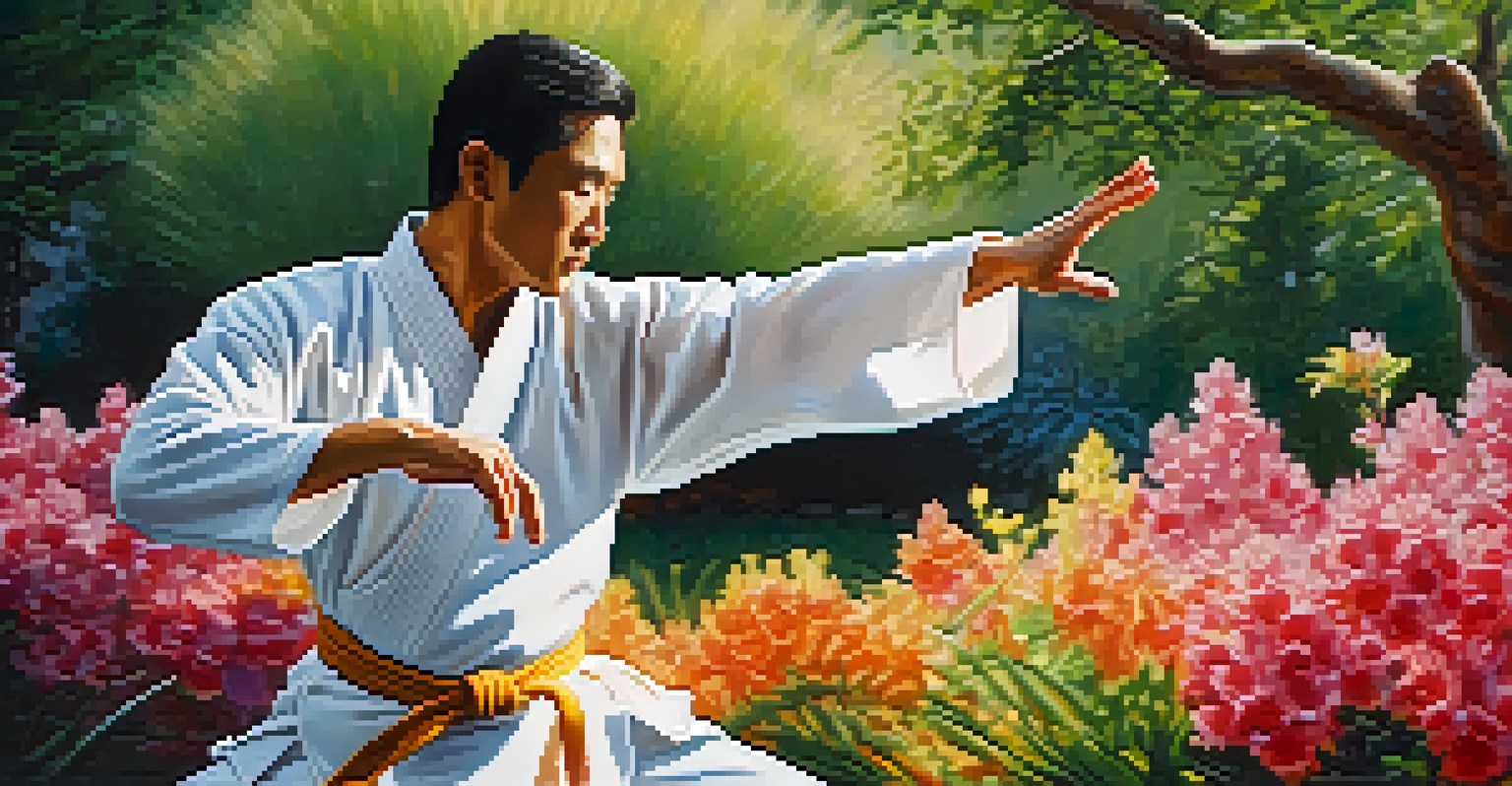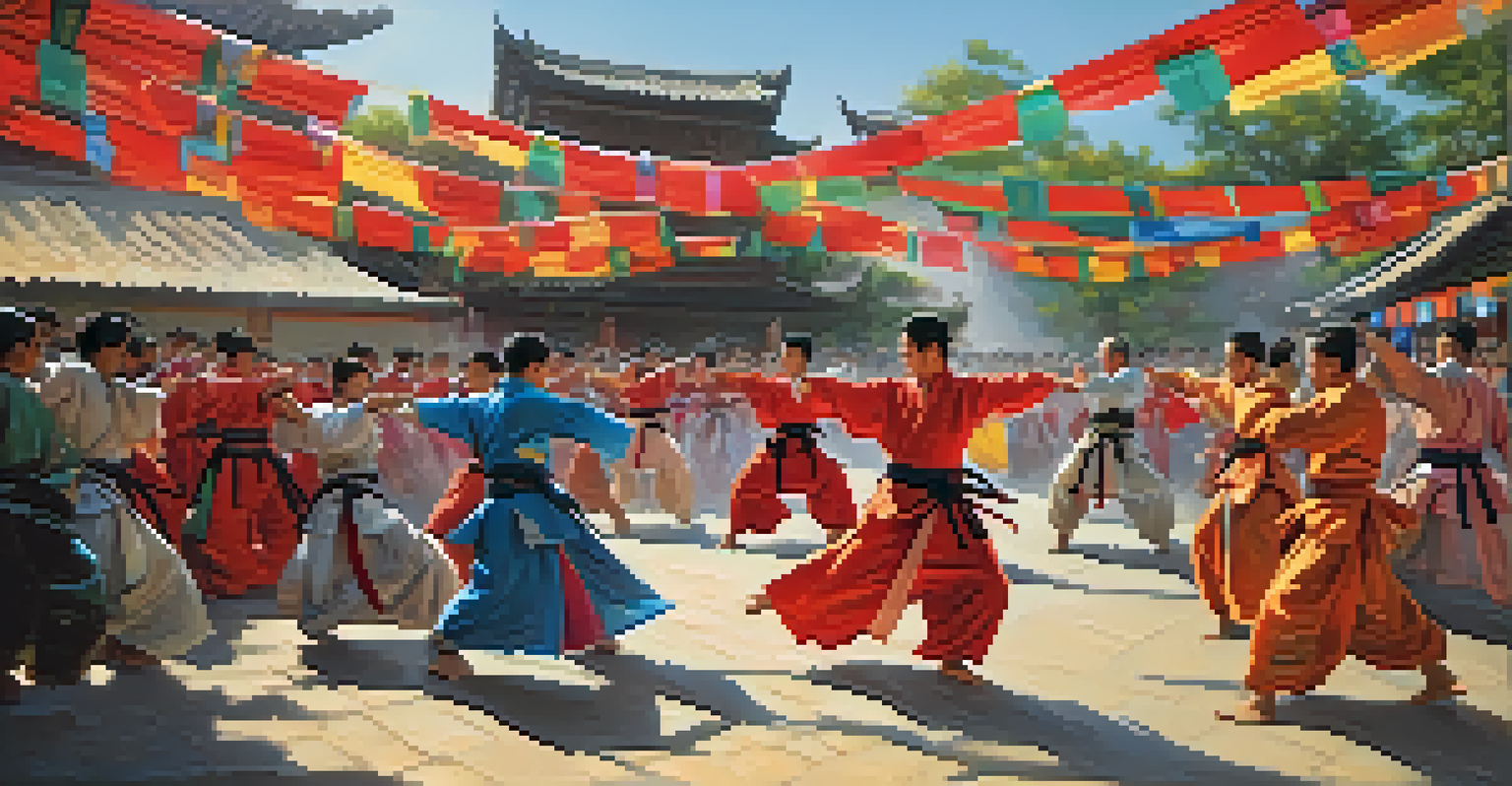Cultural Identity and Martial Arts: A Global Perspective

Understanding Cultural Identity in Martial Arts
Cultural identity is a sense of belonging to a group defined by shared characteristics, such as language, traditions, and values. In martial arts, this identity is often deeply rooted in the history and philosophies of the discipline. For example, karate embodies the spirit of Okinawan culture, emphasizing respect and discipline.
Martial arts are a means of self-discovery and cultural expression, allowing individuals to connect deeply with their heritage and values.
Martial arts serve as a medium through which practitioners connect with their heritage. Each style tells a story, passing down cultural values from generation to generation. This connection not only fosters a sense of belonging but also encourages the preservation of cultural practices.
As students engage with martial arts, they often find themselves exploring their own identities. The practice becomes a journey of self-discovery, where individuals can reflect on their cultural backgrounds while learning techniques that have stood the test of time.
Martial Arts as a Reflection of Cultural Values
Different martial arts styles reflect the unique values of their cultures. For instance, Brazilian Jiu-Jitsu emphasizes adaptability and strategy, mirroring the Brazilian spirit of resilience. In contrast, traditional Chinese martial arts often highlight harmony with nature and inner peace.

These values shape not only the techniques practiced but also the philosophy behind them. Practitioners are taught to respect their teachers, peers, and the art itself, which is a common value across many cultures. This mutual respect fosters a sense of community and shared purpose.
Cultural Identity in Martial Arts
Martial arts provide a unique way for practitioners to connect with their cultural heritage and values.
As martial arts spread globally, they often adapt to local cultures, creating a blend of traditional values and contemporary practices. This fusion illustrates how martial arts can serve as a bridge, connecting diverse cultural identities while promoting understanding and respect.
The Role of Martial Arts in Cultural Preservation
Martial arts play a significant role in preserving cultural heritage. Many traditional styles are at risk of fading away due to modernization and globalization. However, schools and practitioners are making efforts to maintain these practices by teaching them authentically and encouraging their communities to engage.
The beauty of martial arts lies in its ability to adapt and evolve, reflecting the diverse cultural identities of its practitioners while honoring its traditions.
For example, the revival of interest in Capoeira in Brazil has helped to preserve not just the martial art itself but also the music, dance, and history associated with it. Events and competitions celebrate these elements, keeping the culture alive and relevant.
Moreover, international martial arts tournaments often showcase various styles, promoting cultural exchange. This not only helps preserve individual martial arts but also allows practitioners to appreciate the rich tapestry of global cultures.
Martial Arts and Identity Formation in Youth
For many youngsters, martial arts provide more than just physical training; they are a means of identity formation. As children learn techniques and values, they also develop a sense of who they are within their cultural context. This is particularly important in multicultural societies, where children may navigate multiple identities.
Martial arts classes often become a safe space for youth to explore these identities. They learn not only about fighting techniques but also about teamwork, respect, and discipline—values that can positively shape their self-perception and interactions with others.
Martial Arts as a Social Tool
Martial arts programs empower marginalized communities, promoting social change and breaking down cultural barriers.
Furthermore, as they engage in martial arts, students often take pride in their cultural heritage. This newfound confidence can empower them to share their backgrounds with others, fostering inclusivity and understanding in their communities.
Globalization and the Evolution of Martial Arts
Globalization has dramatically affected martial arts, leading to the blending of styles and techniques. As practitioners travel and share their experiences, they often incorporate elements from various cultures, creating hybrid forms of martial arts. This evolution reflects the interconnectedness of our global society.
While some may argue that this fusion dilutes traditional practices, others see it as an opportunity for growth. By embracing diverse influences, martial arts can evolve while still preserving their core values. For example, modern mixed martial arts (MMA) combine techniques from various disciplines, reflecting a broader understanding of combat.
This blending can also promote cultural exchange, leading to greater appreciation and respect for different traditions. As martial arts continue to evolve, they demonstrate the dynamic nature of cultural identity itself, adapting while remaining rooted in history.
Martial Arts as a Tool for Social Change
Martial arts have often been utilized as a platform for social change, addressing issues such as inequality and injustice. Many practitioners advocate for empowerment through martial arts, particularly for marginalized communities. Programs focused on self-defense, for instance, can help individuals reclaim their strength and confidence.
Organizations around the world leverage martial arts to promote social responsibility and community engagement. By teaching valuable skills and fostering a supportive environment, these programs can help break down cultural barriers and build bridges between diverse groups.
Evolving Traditions in Globalization
Globalization leads to the blending of martial arts styles, creating hybrid forms while preserving core cultural values.
Additionally, martial arts can provide a voice for those who may feel unheard. Through demonstrations and competitions, practitioners often highlight the importance of cultural identity, advocating for respect and understanding in a globalized world.
The Future of Cultural Identity in Martial Arts
As we look to the future, the relationship between cultural identity and martial arts will likely continue to evolve. With advancements in technology and communication, practitioners will have even greater access to diverse styles and philosophies. This can lead to enriched learning experiences and deeper connections among martial artists worldwide.
However, the challenge remains to balance the preservation of traditional practices with the embrace of innovation. As martial arts adapt to new contexts, it's crucial to honor their origins and the cultural identities they represent.

Ultimately, martial arts will remain a powerful expression of cultural identity, fostering a sense of belonging while promoting understanding and unity across the globe. As practitioners engage with their art, they will continue to explore who they are and how they fit into the larger narrative of human experience.